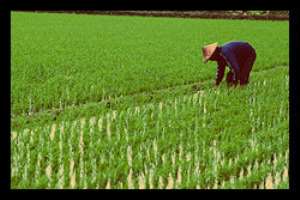
President John Dramani Mahama is absolutely leaving footprints in the sand of time.
During a recent “thank you” tour of the North East Region, he delivered a welcome news for the local agricultural sector: the establishment of a new, state-of-the-art rice mill at Jadima, in the Mamprugu Moagduri District of the North East Region.
This significant investment promises to transform the region’s rice production capacity, generate substantial employment opportunities, and contribute to Ghana’s overall food security.
The announcement, met with enthusiasm by local farmers and residents, underscored the government’s commitment to supporting agriculture and rural development.
The proposed rice mill is projected to process an impressive 30,000 metric tonnes of locally grown rice annually. This will not only provide a ready market for local farmers but also drastically reduce the reliance on imported rice, a key objective of Mahama’s government’s broader agricultural strategy.
The North East Region, with its fertile lands and dedicated farming communities, holds immense potential for rice production.
However, a lack of adequate processing facilities has historically hampered its growth. Farmers have often faced challenges in finding markets for their produce, leading to lower prices and reduced profitability.
The new rice mill will directly address this challenge, providing a guaranteed outlet for locally produced rice and empowering farmers to increase their yields and income.
Beyond the immediate benefits to farmers, the establishment of the rice mill is projected to create an estimated 2,000 jobs in the region.
This includes opportunities in various sectors, from rice cultivation and harvesting to processing, packaging, and distribution. The ripple effect of these jobs will be significant, boosting local economies and improving the livelihoods of families in the North East Region.
“This rice mill is not just a factory, it is a symbol of hope, a signal of change, and a tool for empowerment,” President Mahama stated. “We are moving from subsistence to sustainability, and from survival to prosperity.”
“Our farmers work hard, but for too long, they’ve lacked the systems to add value to their produce. This facility will ensure their efforts are rewarded,” he said.
The initiative aligns with the government’s broader strategy of promoting import substitution and boosting local agricultural production.
By reducing the country’s dependence on imported rice, Mahama’s government aims to save valuable foreign exchange and create a more resilient and sustainable agricultural sector. The establishment of the rice mill in the North East Region is a crucial step in achieving this goal.
The new facility is expected to incorporate modern technology and best practices in rice processing, ensuring high-quality rice that meets the standards of both local and international markets. This will not only benefit consumers by providing access to locally produced, nutritious rice but also open up opportunities for export in the future.
President John Mahama also disclosed a close collaboration
with the National Buffer Stock Company.
“I have instructed the Buffer Stock Company to purchase all the rice produced from this mill,” he announced. “We will pay for it and use it to feed our children in senior high schools across the country. This is how we create a complete local value chain, from the farmer’s field to the dining halls.”
The President’s announcement has been widely welcomed by stakeholders in the agricultural sector. Farmer groups have expressed their gratitude for the government’s commitment to supporting local rice production. They believe that the new rice mill will provide them with the necessary infrastructure and market access to increase their yields and improve their livelihoods.
The establishment of the rice mill in the North East Region represents a significant investment in the future of the region and the country as a whole.
It is a demonstration of President John Mahama’s government’s commitment to supporting agriculture, promoting economic growth, and creating jobs for the people of Ghana.
The project holds the promise of transforming the North East Region into a hub for rice production and contributing significantly to Ghana’s food security and economic prosperity.
Anthony Obeng Afrane


